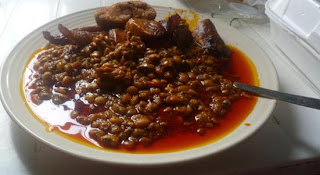
I have been in Ghana for 2 and a half months now. During this time I have been able to learn and appreciate Ghanaian culture. I owe a lot of my experience here to my host family. They work hard to ensure they are integrating us into the Ghanaian culture. For example, they serve us Ghanaian foods such as fufu, banku, and red-red. They also invite us to attend church with them and have taught us some phrases in Fante. It is all the little things they do for both Caro & I each and everyday that we are extremely grateful for.
Before I left for Ghana I received the contact information for my host, Hilda. I had emailed her before leaving and from our emails I learned that she was a third year university student like myself and so I assumed she was living alone and had an available room for Caro & I. Back on June 10th, I arrived in Takoradi and saw that my assumption was way off! There are 13 people living in my house (including Caro & I)! That being said there is never a dull moment and I wouldn’t have it any other way!
Each of my family members has played such an important role in my experience here in Ghana and I would love to share with you all a bit about each of them.
My host mother is Alice. She is dedicated and hardworking. She works full-time as a registered nurse at the Regional Hospital. On top of that she raises the children, some of which are her brothers children but he had to travel to France for a job and since she was the eldest she took on the task of raising the children. One of mine and Caro’s favourite things about Alice is the way she is always complimentary. She comments on our hair braids and our dresses. “You look so nice! AYYY!” It’s hilarious and we look forward to seeing her off to work every morning just so we can say “woho ye few” (you look beautiful)!
Alice comes from a family of 10 children. 2 of her siblings live with her. One of them is Emmanuel. Caro & I refer to him as “Mr. Mom”. You never see him sitting down relaxing. He is always in the kitchen cooking and cleaning. He also runs his own business installing curtains and blinds. Emmanuel has a beautiful singing voice and it is rare to not see him dancing around and singing! It always starts the day on the right track when Caro & I wake up for breakfast and he is singing away!
Abe is the second sibling of Alice’s that stays in the house. He has one son, Anthony, who also lives in the house. Anthony is 11 or 12. He changes it each time we ask him! Abe works for Pepsi and spends his days delivering Pepsi to various towns.
Alice has 4 children. Her first born is George who is 26. He is our “big brother”. He is always looking out for both Caro & I and has been a great friend to us. Her second child is Charles who is very quiet although he will speak to us if we ask him a question. Then there is Kingsley who lives in Accra. We met him once when he came home to visit and he was very friendly. Lastly there is Hilda, Alice’s only daughter. Hilda is the woman who applied to QPID to host us for the summer. She is on summer holidays from University where she does financial & accounting studies. Hilda wakes bright & early each and every morning and works around the house all day. She is always trying to help Caro & I with whatever she possibly can and we are very thankful to have her as our Ghanaian sister.
Then there are 4 other children who I have not mentioned yet. They are Ruby (who goes by “Moe”), Timothy (who goes by “Nub”), Godfred, and Hilda Jr. These children stay with Alice as their father has gone to France to work. He comes home to visit them every now and then. I am not sure when they saw him last. Their mother is in Ghana however I am unsure why the children were not able to stay with her. The children are always helping in the kitchen and with the laundry. It is very rare to see them sitting around! When we first arrived in Takoradi the children could not even stay in the same room as Caro & I because they were terribly shy. Now they are still quiet around us but they don’t run and hide! We often play football with them or watch TV. Lately we have convinced Moe to give us some Ghanaian dance lessons!
Lastly there is Chi-Chi & Tiny: the cats. Chi-Chi is a cute cat who loves to roam around the kitchen in search of food. He has a broken hip though and as a result drags himself around the floor. Tiny is a kitten who seems to be permanently small. She really likes to cuddle with Caro!
This is my Ghanaian family. They all have a special place in my heart and I am dreading leaving them next weekend! They have helped me create many fantastic memories and I am going to miss each and everyone of them when I return to Canada. I hope to be able to visit Ghana again one day!






